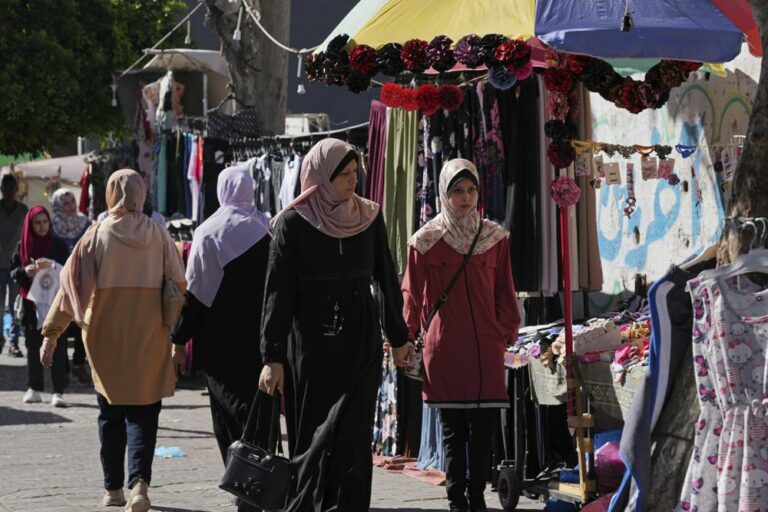Gaza’s Hamas rulers have imposed a slew of new taxes on imported clothes and office supplies just ahead of the new school year, sparking limited but rare protests in the impoverished coastal strip.
The move by the militant group comes at a time when Gaza’s 2.3 million people are suffering not only from a 15-year Israeli-Egyptian blockade, but also from a new jump in prices caused by global supply-chain issues and the Russian invasion of Ukraine.
“This is a wrong, oppressive decision that destroys the national economy,” said Nahed al-Sawada, who imports clothes from China and Turkey.
A list by the Ministry of Economy includes planned taxes on items like packaged nuts, with an import tariff of 2,000 shekels (nearly $600) per ton. In the past, nuts were imported tax free. The tariff on a ton of toilet paper rose from $90 to $580. The taxes are set to go into effect on Aug. 1.
The list also includes a tax of about $3 on pair of jeans, and $230 on a ton of plastic folders used to store papers. Demand for these items increases ahead of the school year.
Emad Abdelhadi, a representative for Gaza’s union of clothes’ merchants, said a new pair of jeans sells for $3 to $10, and the new tax will pose an unfair burden on struggling consumers.
In a territory suffering from rampant poverty and unemployment approaching 50%, he said many Gazans already look for used clothes. The new taxes, he said, “will deprive them of the ability to buy.”
Gaza’s economy has been hit hard by the Israeli-Egyptian blockade, imposed when Hamas seized power in 2007. Israel says the blockade is needed to prevent Hamas from arming, but critics say the restrictions, which include tight limits on exports, amount to collective punishment.
Hamas’ government is not internationally recognized and Israel and its Western allies consider the group, which opposes Israel’s existence and has in the past staged deadly suicide bombings against Israelis, a terrorist organization.
Israel and Hamas have fought four wars since the Hamas takeover, further straining the territory’s rundown infrastructure. Electricity is in short supply, tap water undrinkable and the health care system is in shambles.
With tens of thousands of civil servants to support, as well as its heavy spending on its military wing, it is no surprise that Hamas is seeking new sources of revenue. Still, the timing is questionable, coming at a time when the Russian invasion of Ukraine has driven up consumer prices worldwide.
Hamas authorities say the new taxes are meant to protect the local industries. But experts and business people challenge this argument, since badly needed raw materials are now being taxed.
Mohammed Abu Jayyab, an economist, said the taxes have failed to protect local manufacturers because the government still taxes raw materials and production lines.
A spokesman for the Economy Ministry did not return requests for comment.
Hamas doesn’t release figures on its funding resources or budgets, but the latest steps are part of a series of taxes targeting a wide array of sectors, from street vendors selling hot drinks to restaurants, home building and cars.
The government offers few services in exchange, and most aid and relief projects are covered by the international community. The funds help Hamas operate a government and powerful armed wing.
Protests against Hamas are rare and often met by force. But earlier this month, about two dozen members of the clothes merchants’ union expressed their frustration in public. They stood inside the building housing their union in Gaza City and held new pairs of jeans, with the price tags still on them, in the air for about half an hour.
Two days later, the merchants gathered outside the offices of Hamas lawmakers. Police prevented the media from filming and ordered the protest to stop after allowing representatives of the union inside to talk to the lawmakers. The protest ended peacefully.
“The lawmakers acknowledged the taxes were high, and said they will look into it,” said Abdelhadi, the union representative.
But he said he did not expect a positive outcome. “By these decisions, they have issued a death sentence against the industry.”
(AP)











